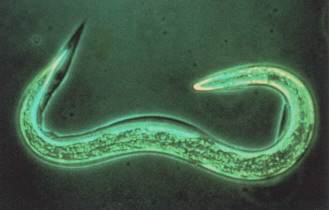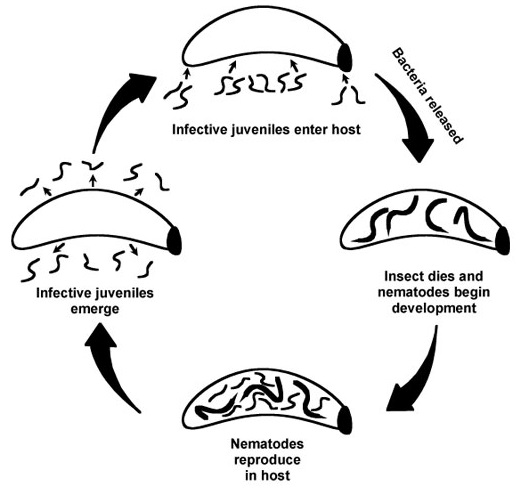In this series of articles, Growers Network discusses a few beneficial organisms you can use to benefit your Cannabis grow. Today’s Topic: Nematodes.

Hello growers! Hopefully your crop is healthy and green. Question: Are you using any beneficials as part of your pest control program? Did you know that you can use beneficial nematodes to help protect your plants from the things out there that would like to hurt it? True story! Read on for all the news on nematodes!
Writer’s Note: There are many different species of nematode, some are harmful and some are helpful. So if you hear about someone's crop being destroyed by nematodes, those aren’t the species we’re discussing today!
Quick Look
Scientific Name: Various species in the Phylum Nematoda
Including:
- Heterorhabditis bacteriophora
- Steinernema carpocapsae
- Steinernema Feltiae
Common Name: Roundworms
How They Help: Paracistize pest species associated with Cannabis
“A nema-what?”
Nematodes are tiny invertebrates commonly referred to as roundworms. Nematodes are often predatory and nearly half are considered parasitic. Some are microscopic while other free-living nematodes can be much larger. When using them for pest control, different species will parasitize different arthropod pests both above and below the soil.

Beneficial nematode under the microscope
How Nematodes Help
Nematodes are hunters, and different species employ different hunting strategies. Some, like Heterorhabditis bacteriophora work beneath the soil, while the species Steinernema carpocapsae waits for a pest to walk by and attaches itself to the unsuspecting host. Both of these strategies allow the juvenile nematode to enter and kill the pest via a toxic bacterium, and then use the resulting corpse as part of its reproductive cycle, reproducing inside and sending their juveniles out into the environment to find their next host.

An important thing to consider if you’re planning on using beneficial nematodes is that you have to keep your soil “clean.” Often, recycled soil contains other microbial pests that can kill off your beneficials, particularly certain species of fungi and bacteria. For this reason it’s important to use the cleanest substrate you can find and consider treating with a fungicide/bactericide combo in addition to using beneficials.
Editor’s Note: You can also treat “dirty” media with other beneficials. A variety of soil inoculants are commercially available.
So there it is, beneficial nematode basics. While there are many pest control options available, the upside of beneficials such as the nematode is that they add a layer of organic defense when pesticides just won’t cut it due to safety and regulations, and this is especially important with a medicinal plant like Cannabis. Read on and check the list below to see what species of nematode we mentioned is best for each pest.
Happy growing!
Targeting Pests with Nematodes
Heterorhabditis bacteriophora can help prevent:
- Ticks
- Ant Queens
- Adult Fleas
- Humpback Flies
- Leafminers
- Gall Midges
- Moths
- Some Species of Weevils
Steinernema carpocapsae can help prevent:
- Black Cutworms
- Caterpillars
- Flea Larvae
- Fly Larvae
- Webworms
- Wireworms
- Wood Borers
- Some Species of Weevils
Steinernema Feltiae can help prevent:
- Black Cutworms
- Fungus Gnats
- Pill Worm
- Root Maggots
- Shore Flies
- Ticks
- Some Species of Weevils
10 Best Gift Ideas for Cannabis Connoisseurs and Growing Aficionados (2022)
December 7, 2022Developing and Optimizing a Cannabis Cultivation System
December 14, 2021Dealing with Insomnia: How Can CBD Help?
December 10, 2020Your Guide to Sleep and CBD
December 7, 2020
Do you want to receive the next Grower's Spotlight as soon as it's available? Sign up below!

Do you have any questions or comments?

About the Author
Chris DeWildt is a graduate of Grand Valley State University and Western Kentucky University. He worked in education and publishing for ten years before joining the team at Growers Network.